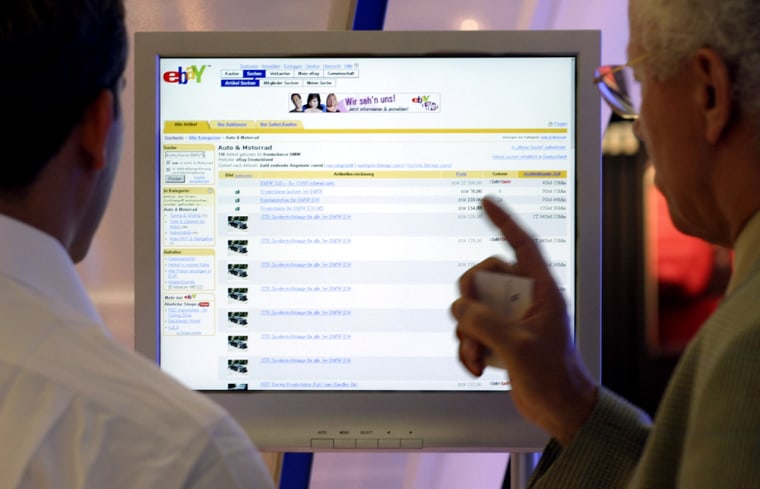The days of parking the ol’ Family Truckster at a Safeway lot with a Day-Glo orange “For Sale” sign in the window may be numbered. Increasingly, consumers are taking advantage of a growing online market to sell their cars themselves rather than accepting a lowball trade-in offer from a dealer.
The trend gained momentum last year as consumers found car dealers especially stingy with their trade-in offers because they were struggling to resell the fuel-thirsty SUVs, pickups and large sedans that consumers were dumping as gas prices soared.
By the end of the year private-party sales represented 34 percent of the used-car market, up from 18 percent a year earlier, according to a report by CNW Marketing Research Inc. That put individual sales on par with sales by franchised dealers and ahead of those by independent used car dealers.
At the same time the average value of cars sold by individuals ballooned to $7,000 from $4,500, according to CNW President Art Spinella. While the abrupt shift to DIY sales may have been motivated by a desire to get more money for a used car, the transactions were made simpler by the emergence of a slew of increasingly well-oiled online vehicle bazaars, Spinella noted.
The numbers at some of those online outlets bear that out.
Classified ads Web site Craigslist saw its monthly car sales listings climb to 1 million last month from 400,000 in February 2006, said president and CEO Jim Buckmaster. From two-thirds to three-quarters of the cars advertised on Craigslist are offered by individuals, and the site lets shoppers filter ads to eliminate those posted by dealers, he said.
Rob Chesney, vice president of eBay Motors, said traffic on his Web site “corroborates” the CNW data, although he declined to provide specific numbers.
Other online auto marketplaces, like Cars.com, AutoTrader.com, Kelly Blue Book and the online classifieds of local newspapers, have contributed to the shift, CNW’s Spinella observed. The growth comes at the expense of traditional dealers, but independent, non-franchised dealers have been hit especially hard, he added.
Paul Taylor, chief economist for the National Automobile Dealers Association, argues that sales are shifting because franchised car dealers are being more selective, focusing their attention at the higher end of the market, said. The average value of used cars these franchises sold last year was $15,000, more than double the value of those sold by individuals, he points out.
“The dealers themselves would say, ‘We’re simply not able to offer a lot, and you might be better off selling it yourself,’” Taylor said. He also said much of the motivation for consumers to sell cars themselves was driven by a temporary market response to higher gas prices.
“To a certain extent, this is temporary, not any dramatic long-term shift,” Taylor said. Next time around, consumers who sold a car themselves are likely to return to their habit of trading it in at a dealer, he said.
But the enormous reach of the Internet might make some changes permanent, especially because buyers believe today’s used cars are more reliable than those in the past and so might not need the service support of a dealer.
“People who have a two- or three-year-old Camry don’t even have to pay a classified ad fee” when advertising on Craigslist, Spinella noted. “You are going to get a photo and more space than you’d have gotten in an old newspaper classified ad."
But it was the financial transaction itself — and not the experience of advertising and selling their own cars — that irked consumers in the past, said NADA’s Taylor.
“The company bulletin board has always been free. The sign in the window has always been free,” he said. “The irritation has always been with actually meeting the people and showing the car and making sure the check is good, as opposed to just dropping the car off and receiving the check. We think a lot of new car buyers will continue to use the convenience of the trade-in.”
That might be wishful thinking, said eBay’s Chesney.
“Consumers are becoming more comfortable with using the Internet for increasingly expensive purchases,” he said.
Trust is the critical issue, and eBay aims to foster it through the site’s feedback rating system, which serves as a sort of online credit report for both the buyer and the seller, Chesney said. EBay also pledges to protect buyers from outright fraud, offering $20,000 of protection for any misrepresentation of vehicles.
The CarFax system of car history reports also helps by offering buyers third-party verification of a car's condition. “It shows the seller is being upfront and honest,” said Christopher Basso, a spokesman for CarFax.
All of this makes online used car buying and selling easier and safer than ever. But the underlying motivation remains getting the best deal, Spinella observed.
“For $500 or $600 [lower value] the trade-in is convenient,” he said. “For $2,000, it’s less convenient.”
